BSc Business Management BMP3004 - Factors Motivating Employees
VerifiedAdded on 2023/06/14
|9
|2125
|356
Report
AI Summary
This report provides an analysis of the factors that motivate employees in the workplace, focusing on both positive and negative influences on their job roles. It delves into the meaning of motivation, referencing Maslow's hierarchy of needs and differentiating between extrinsic and intrinsic motivation. The report identifies key motivational factors such as work atmosphere, salary, and promotion opportunities, while also addressing negative factors like low wages, challenging work, and ineffective employee management. Strategies for coping with these negative factors are discussed, including fostering respect and trust, providing opportunities for employees to express their opinions, and ensuring flexibility in targets. The report concludes that motivation is crucial for enhancing productivity and maintaining a positive work environment, emphasizing the importance of flexibility, discipline, and positive relationships between employees and management. Desklib provides access to more resources like this, including solved assignments and past papers, to support student learning.
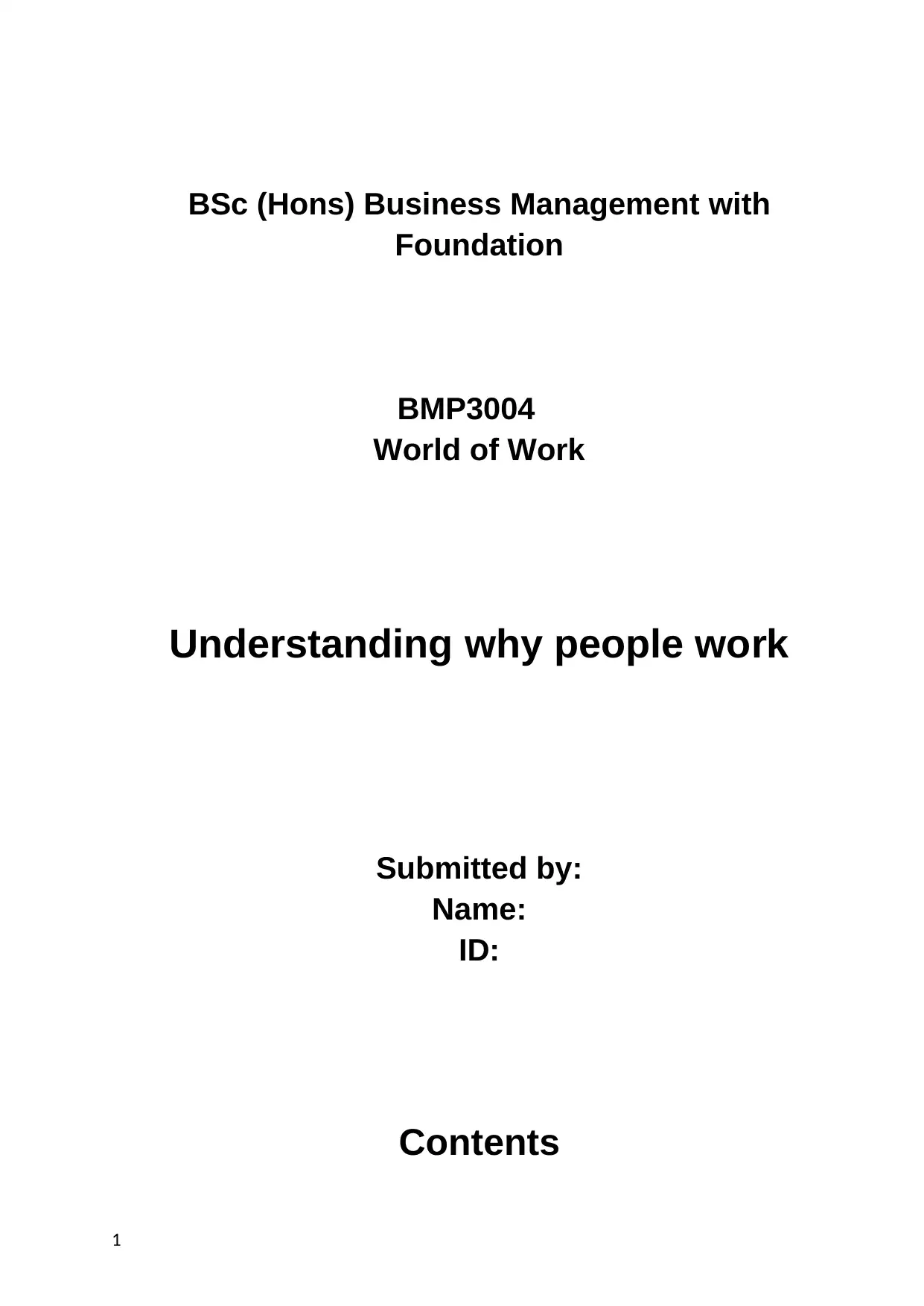
BSc (Hons) Business Management with
Foundation
BMP3004
World of Work
Understanding why people work
Submitted by:
Name:
ID:
Contents
1
Foundation
BMP3004
World of Work
Understanding why people work
Submitted by:
Name:
ID:
Contents
1
Paraphrase This Document
Need a fresh take? Get an instant paraphrase of this document with our AI Paraphraser
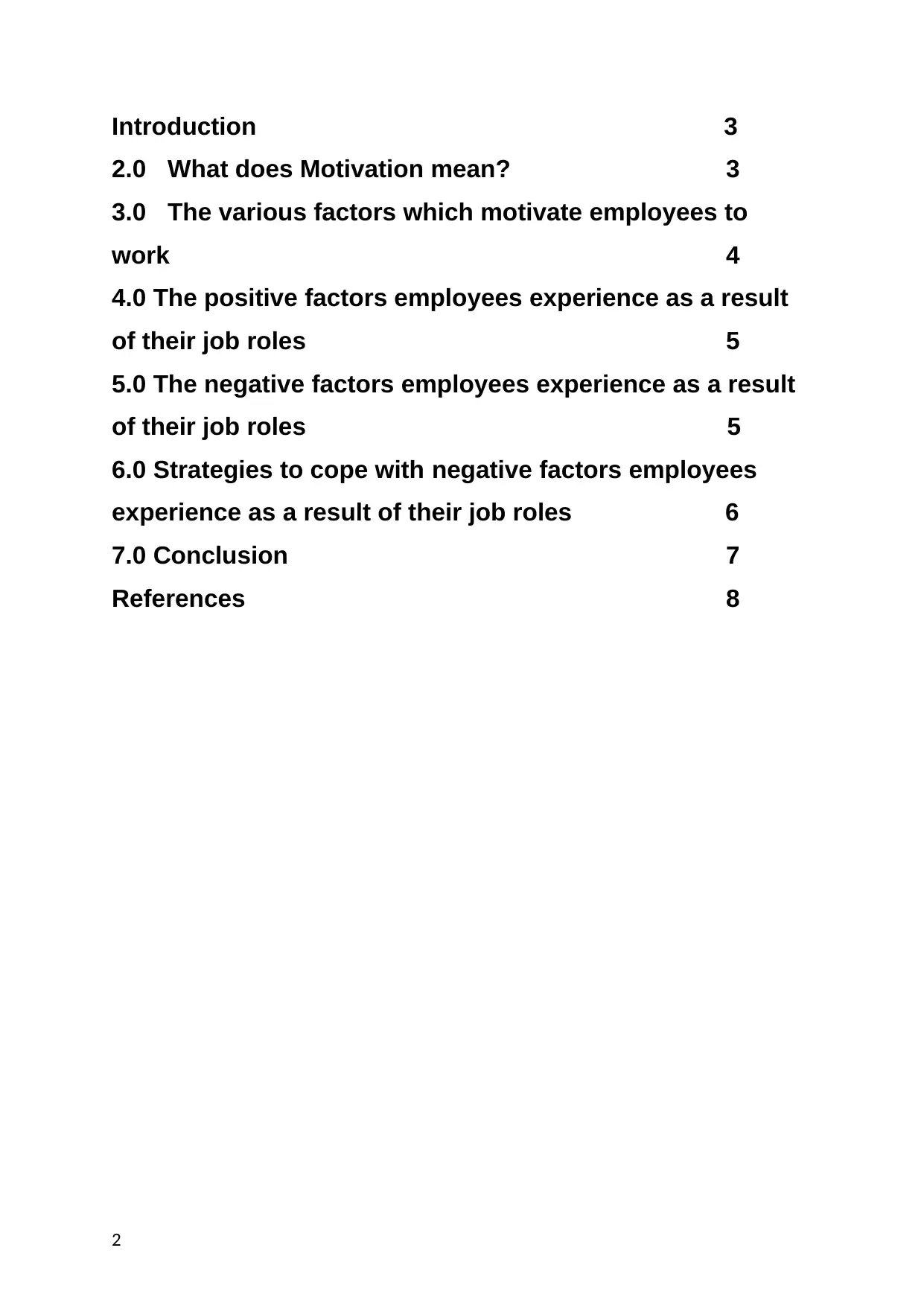
Introduction 3
2.0 What does Motivation mean? 3
3.0 The various factors which motivate employees to
work 4
4.0 The positive factors employees experience as a result
of their job roles 5
5.0 The negative factors employees experience as a result
of their job roles 5
6.0 Strategies to cope with negative factors employees
experience as a result of their job roles 6
7.0 Conclusion 7
References 8
2
2.0 What does Motivation mean? 3
3.0 The various factors which motivate employees to
work 4
4.0 The positive factors employees experience as a result
of their job roles 5
5.0 The negative factors employees experience as a result
of their job roles 5
6.0 Strategies to cope with negative factors employees
experience as a result of their job roles 6
7.0 Conclusion 7
References 8
2

3
⊘ This is a preview!⊘
Do you want full access?
Subscribe today to unlock all pages.

Trusted by 1+ million students worldwide
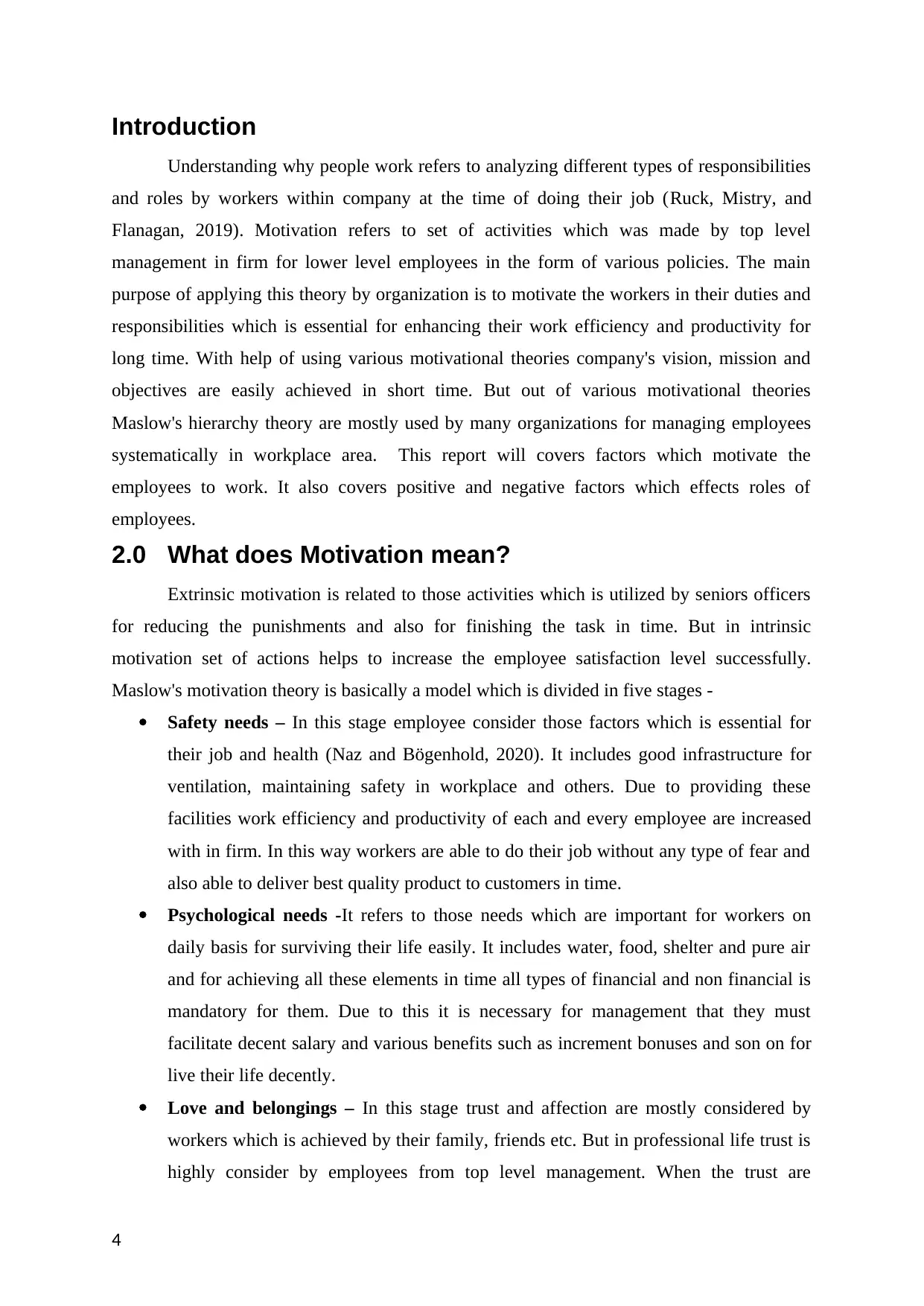
Introduction
Understanding why people work refers to analyzing different types of responsibilities
and roles by workers within company at the time of doing their job (Ruck, Mistry, and
Flanagan, 2019). Motivation refers to set of activities which was made by top level
management in firm for lower level employees in the form of various policies. The main
purpose of applying this theory by organization is to motivate the workers in their duties and
responsibilities which is essential for enhancing their work efficiency and productivity for
long time. With help of using various motivational theories company's vision, mission and
objectives are easily achieved in short time. But out of various motivational theories
Maslow's hierarchy theory are mostly used by many organizations for managing employees
systematically in workplace area. This report will covers factors which motivate the
employees to work. It also covers positive and negative factors which effects roles of
employees.
2.0 What does Motivation mean?
Extrinsic motivation is related to those activities which is utilized by seniors officers
for reducing the punishments and also for finishing the task in time. But in intrinsic
motivation set of actions helps to increase the employee satisfaction level successfully.
Maslow's motivation theory is basically a model which is divided in five stages -
Safety needs – In this stage employee consider those factors which is essential for
their job and health (Naz and Bögenhold, 2020). It includes good infrastructure for
ventilation, maintaining safety in workplace and others. Due to providing these
facilities work efficiency and productivity of each and every employee are increased
with in firm. In this way workers are able to do their job without any type of fear and
also able to deliver best quality product to customers in time.
Psychological needs -It refers to those needs which are important for workers on
daily basis for surviving their life easily. It includes water, food, shelter and pure air
and for achieving all these elements in time all types of financial and non financial is
mandatory for them. Due to this it is necessary for management that they must
facilitate decent salary and various benefits such as increment bonuses and son on for
live their life decently.
Love and belongings – In this stage trust and affection are mostly considered by
workers which is achieved by their family, friends etc. But in professional life trust is
highly consider by employees from top level management. When the trust are
4
Understanding why people work refers to analyzing different types of responsibilities
and roles by workers within company at the time of doing their job (Ruck, Mistry, and
Flanagan, 2019). Motivation refers to set of activities which was made by top level
management in firm for lower level employees in the form of various policies. The main
purpose of applying this theory by organization is to motivate the workers in their duties and
responsibilities which is essential for enhancing their work efficiency and productivity for
long time. With help of using various motivational theories company's vision, mission and
objectives are easily achieved in short time. But out of various motivational theories
Maslow's hierarchy theory are mostly used by many organizations for managing employees
systematically in workplace area. This report will covers factors which motivate the
employees to work. It also covers positive and negative factors which effects roles of
employees.
2.0 What does Motivation mean?
Extrinsic motivation is related to those activities which is utilized by seniors officers
for reducing the punishments and also for finishing the task in time. But in intrinsic
motivation set of actions helps to increase the employee satisfaction level successfully.
Maslow's motivation theory is basically a model which is divided in five stages -
Safety needs – In this stage employee consider those factors which is essential for
their job and health (Naz and Bögenhold, 2020). It includes good infrastructure for
ventilation, maintaining safety in workplace and others. Due to providing these
facilities work efficiency and productivity of each and every employee are increased
with in firm. In this way workers are able to do their job without any type of fear and
also able to deliver best quality product to customers in time.
Psychological needs -It refers to those needs which are important for workers on
daily basis for surviving their life easily. It includes water, food, shelter and pure air
and for achieving all these elements in time all types of financial and non financial is
mandatory for them. Due to this it is necessary for management that they must
facilitate decent salary and various benefits such as increment bonuses and son on for
live their life decently.
Love and belongings – In this stage trust and affection are mostly considered by
workers which is achieved by their family, friends etc. But in professional life trust is
highly consider by employees from top level management. When the trust are
4
Paraphrase This Document
Need a fresh take? Get an instant paraphrase of this document with our AI Paraphraser
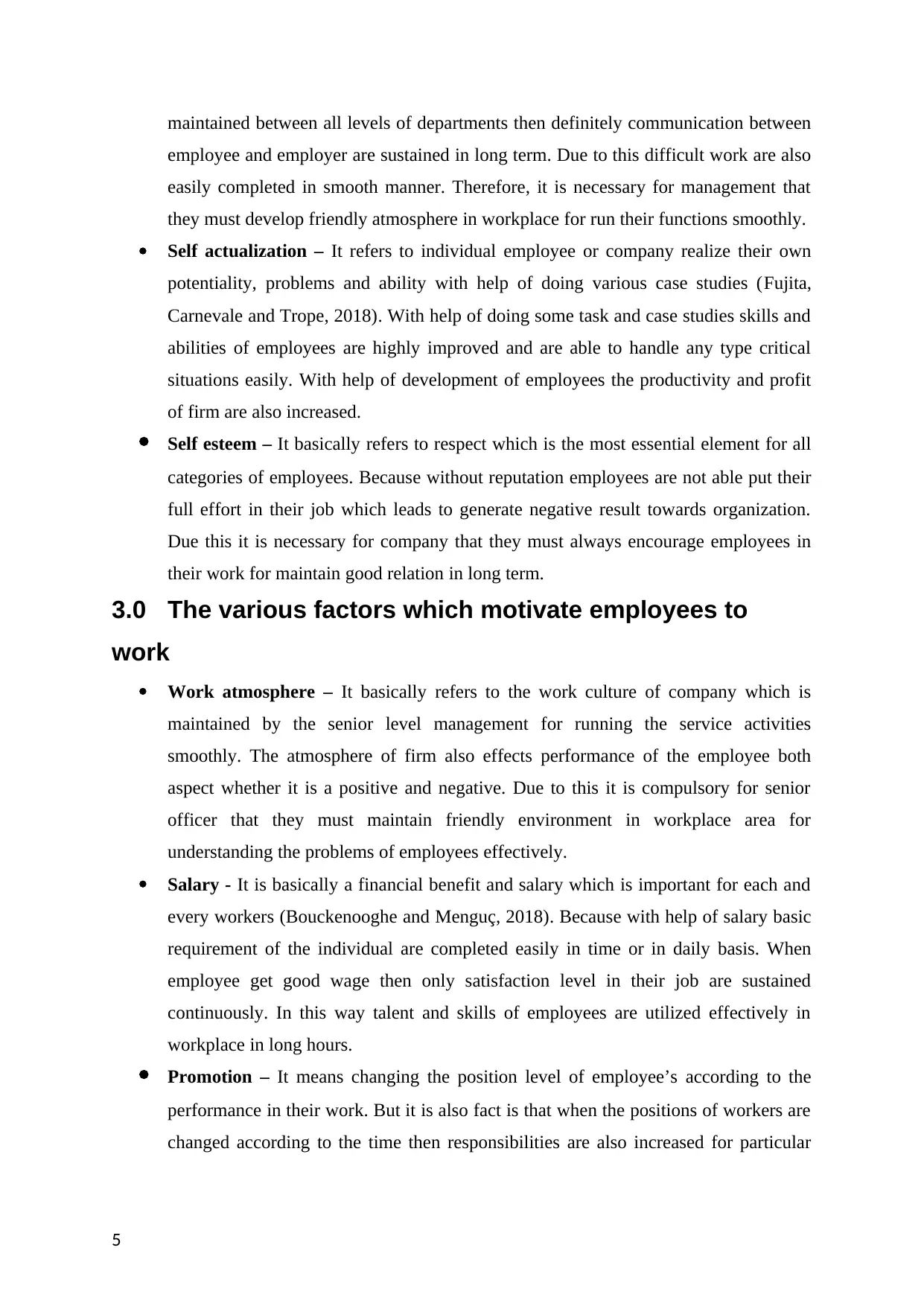
maintained between all levels of departments then definitely communication between
employee and employer are sustained in long term. Due to this difficult work are also
easily completed in smooth manner. Therefore, it is necessary for management that
they must develop friendly atmosphere in workplace for run their functions smoothly.
Self actualization – It refers to individual employee or company realize their own
potentiality, problems and ability with help of doing various case studies (Fujita,
Carnevale and Trope, 2018). With help of doing some task and case studies skills and
abilities of employees are highly improved and are able to handle any type critical
situations easily. With help of development of employees the productivity and profit
of firm are also increased.
Self esteem – It basically refers to respect which is the most essential element for all
categories of employees. Because without reputation employees are not able put their
full effort in their job which leads to generate negative result towards organization.
Due this it is necessary for company that they must always encourage employees in
their work for maintain good relation in long term.
3.0 The various factors which motivate employees to
work
Work atmosphere – It basically refers to the work culture of company which is
maintained by the senior level management for running the service activities
smoothly. The atmosphere of firm also effects performance of the employee both
aspect whether it is a positive and negative. Due to this it is compulsory for senior
officer that they must maintain friendly environment in workplace area for
understanding the problems of employees effectively.
Salary - It is basically a financial benefit and salary which is important for each and
every workers (Bouckenooghe and Menguç, 2018). Because with help of salary basic
requirement of the individual are completed easily in time or in daily basis. When
employee get good wage then only satisfaction level in their job are sustained
continuously. In this way talent and skills of employees are utilized effectively in
workplace in long hours.
Promotion – It means changing the position level of employee’s according to the
performance in their work. But it is also fact is that when the positions of workers are
changed according to the time then responsibilities are also increased for particular
5
employee and employer are sustained in long term. Due to this difficult work are also
easily completed in smooth manner. Therefore, it is necessary for management that
they must develop friendly atmosphere in workplace for run their functions smoothly.
Self actualization – It refers to individual employee or company realize their own
potentiality, problems and ability with help of doing various case studies (Fujita,
Carnevale and Trope, 2018). With help of doing some task and case studies skills and
abilities of employees are highly improved and are able to handle any type critical
situations easily. With help of development of employees the productivity and profit
of firm are also increased.
Self esteem – It basically refers to respect which is the most essential element for all
categories of employees. Because without reputation employees are not able put their
full effort in their job which leads to generate negative result towards organization.
Due this it is necessary for company that they must always encourage employees in
their work for maintain good relation in long term.
3.0 The various factors which motivate employees to
work
Work atmosphere – It basically refers to the work culture of company which is
maintained by the senior level management for running the service activities
smoothly. The atmosphere of firm also effects performance of the employee both
aspect whether it is a positive and negative. Due to this it is compulsory for senior
officer that they must maintain friendly environment in workplace area for
understanding the problems of employees effectively.
Salary - It is basically a financial benefit and salary which is important for each and
every workers (Bouckenooghe and Menguç, 2018). Because with help of salary basic
requirement of the individual are completed easily in time or in daily basis. When
employee get good wage then only satisfaction level in their job are sustained
continuously. In this way talent and skills of employees are utilized effectively in
workplace in long hours.
Promotion – It means changing the position level of employee’s according to the
performance in their work. But it is also fact is that when the positions of workers are
changed according to the time then responsibilities are also increased for particular
5
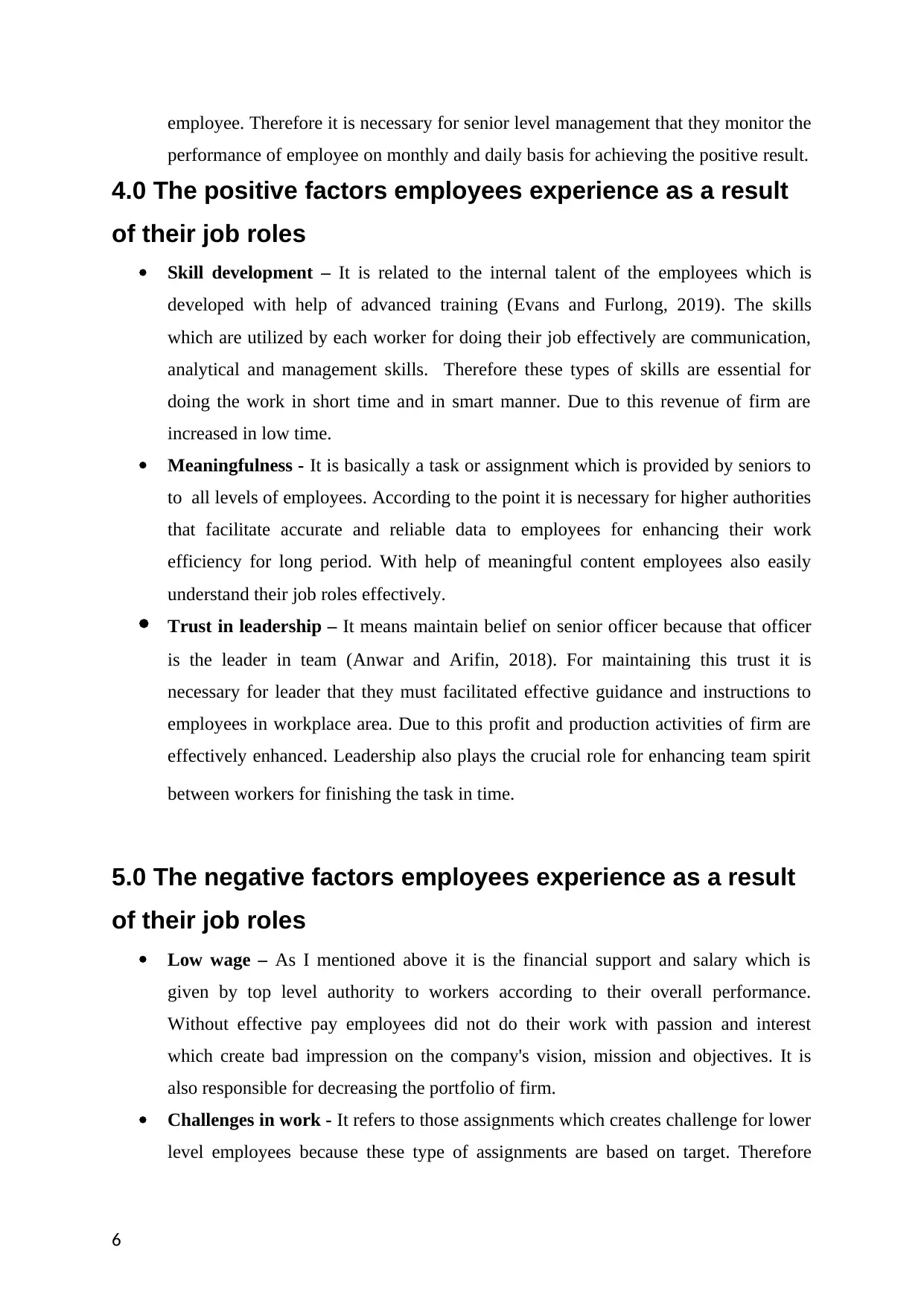
employee. Therefore it is necessary for senior level management that they monitor the
performance of employee on monthly and daily basis for achieving the positive result.
4.0 The positive factors employees experience as a result
of their job roles
Skill development – It is related to the internal talent of the employees which is
developed with help of advanced training (Evans and Furlong, 2019). The skills
which are utilized by each worker for doing their job effectively are communication,
analytical and management skills. Therefore these types of skills are essential for
doing the work in short time and in smart manner. Due to this revenue of firm are
increased in low time.
Meaningfulness - It is basically a task or assignment which is provided by seniors to
to all levels of employees. According to the point it is necessary for higher authorities
that facilitate accurate and reliable data to employees for enhancing their work
efficiency for long period. With help of meaningful content employees also easily
understand their job roles effectively.
Trust in leadership – It means maintain belief on senior officer because that officer
is the leader in team (Anwar and Arifin, 2018). For maintaining this trust it is
necessary for leader that they must facilitated effective guidance and instructions to
employees in workplace area. Due to this profit and production activities of firm are
effectively enhanced. Leadership also plays the crucial role for enhancing team spirit
between workers for finishing the task in time.
5.0 The negative factors employees experience as a result
of their job roles
Low wage – As I mentioned above it is the financial support and salary which is
given by top level authority to workers according to their overall performance.
Without effective pay employees did not do their work with passion and interest
which create bad impression on the company's vision, mission and objectives. It is
also responsible for decreasing the portfolio of firm.
Challenges in work - It refers to those assignments which creates challenge for lower
level employees because these type of assignments are based on target. Therefore
6
performance of employee on monthly and daily basis for achieving the positive result.
4.0 The positive factors employees experience as a result
of their job roles
Skill development – It is related to the internal talent of the employees which is
developed with help of advanced training (Evans and Furlong, 2019). The skills
which are utilized by each worker for doing their job effectively are communication,
analytical and management skills. Therefore these types of skills are essential for
doing the work in short time and in smart manner. Due to this revenue of firm are
increased in low time.
Meaningfulness - It is basically a task or assignment which is provided by seniors to
to all levels of employees. According to the point it is necessary for higher authorities
that facilitate accurate and reliable data to employees for enhancing their work
efficiency for long period. With help of meaningful content employees also easily
understand their job roles effectively.
Trust in leadership – It means maintain belief on senior officer because that officer
is the leader in team (Anwar and Arifin, 2018). For maintaining this trust it is
necessary for leader that they must facilitated effective guidance and instructions to
employees in workplace area. Due to this profit and production activities of firm are
effectively enhanced. Leadership also plays the crucial role for enhancing team spirit
between workers for finishing the task in time.
5.0 The negative factors employees experience as a result
of their job roles
Low wage – As I mentioned above it is the financial support and salary which is
given by top level authority to workers according to their overall performance.
Without effective pay employees did not do their work with passion and interest
which create bad impression on the company's vision, mission and objectives. It is
also responsible for decreasing the portfolio of firm.
Challenges in work - It refers to those assignments which creates challenge for lower
level employees because these type of assignments are based on target. Therefore
6
⊘ This is a preview!⊘
Do you want full access?
Subscribe today to unlock all pages.

Trusted by 1+ million students worldwide
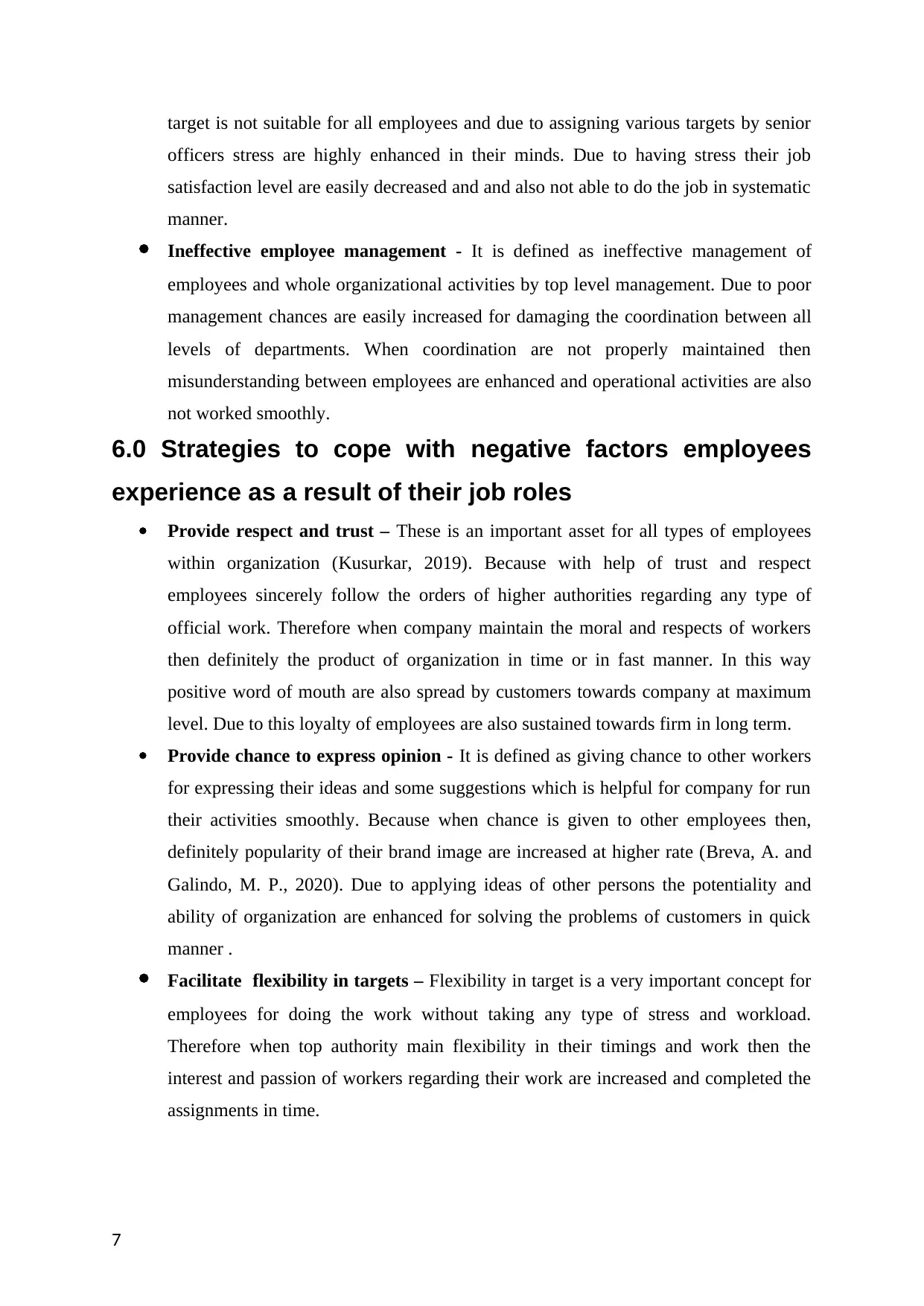
target is not suitable for all employees and due to assigning various targets by senior
officers stress are highly enhanced in their minds. Due to having stress their job
satisfaction level are easily decreased and and also not able to do the job in systematic
manner.
Ineffective employee management - It is defined as ineffective management of
employees and whole organizational activities by top level management. Due to poor
management chances are easily increased for damaging the coordination between all
levels of departments. When coordination are not properly maintained then
misunderstanding between employees are enhanced and operational activities are also
not worked smoothly.
6.0 Strategies to cope with negative factors employees
experience as a result of their job roles
Provide respect and trust – These is an important asset for all types of employees
within organization (Kusurkar, 2019). Because with help of trust and respect
employees sincerely follow the orders of higher authorities regarding any type of
official work. Therefore when company maintain the moral and respects of workers
then definitely the product of organization in time or in fast manner. In this way
positive word of mouth are also spread by customers towards company at maximum
level. Due to this loyalty of employees are also sustained towards firm in long term.
Provide chance to express opinion - It is defined as giving chance to other workers
for expressing their ideas and some suggestions which is helpful for company for run
their activities smoothly. Because when chance is given to other employees then,
definitely popularity of their brand image are increased at higher rate (Breva, A. and
Galindo, M. P., 2020). Due to applying ideas of other persons the potentiality and
ability of organization are enhanced for solving the problems of customers in quick
manner .
Facilitate flexibility in targets – Flexibility in target is a very important concept for
employees for doing the work without taking any type of stress and workload.
Therefore when top authority main flexibility in their timings and work then the
interest and passion of workers regarding their work are increased and completed the
assignments in time.
7
officers stress are highly enhanced in their minds. Due to having stress their job
satisfaction level are easily decreased and and also not able to do the job in systematic
manner.
Ineffective employee management - It is defined as ineffective management of
employees and whole organizational activities by top level management. Due to poor
management chances are easily increased for damaging the coordination between all
levels of departments. When coordination are not properly maintained then
misunderstanding between employees are enhanced and operational activities are also
not worked smoothly.
6.0 Strategies to cope with negative factors employees
experience as a result of their job roles
Provide respect and trust – These is an important asset for all types of employees
within organization (Kusurkar, 2019). Because with help of trust and respect
employees sincerely follow the orders of higher authorities regarding any type of
official work. Therefore when company maintain the moral and respects of workers
then definitely the product of organization in time or in fast manner. In this way
positive word of mouth are also spread by customers towards company at maximum
level. Due to this loyalty of employees are also sustained towards firm in long term.
Provide chance to express opinion - It is defined as giving chance to other workers
for expressing their ideas and some suggestions which is helpful for company for run
their activities smoothly. Because when chance is given to other employees then,
definitely popularity of their brand image are increased at higher rate (Breva, A. and
Galindo, M. P., 2020). Due to applying ideas of other persons the potentiality and
ability of organization are enhanced for solving the problems of customers in quick
manner .
Facilitate flexibility in targets – Flexibility in target is a very important concept for
employees for doing the work without taking any type of stress and workload.
Therefore when top authority main flexibility in their timings and work then the
interest and passion of workers regarding their work are increased and completed the
assignments in time.
7
Paraphrase This Document
Need a fresh take? Get an instant paraphrase of this document with our AI Paraphraser
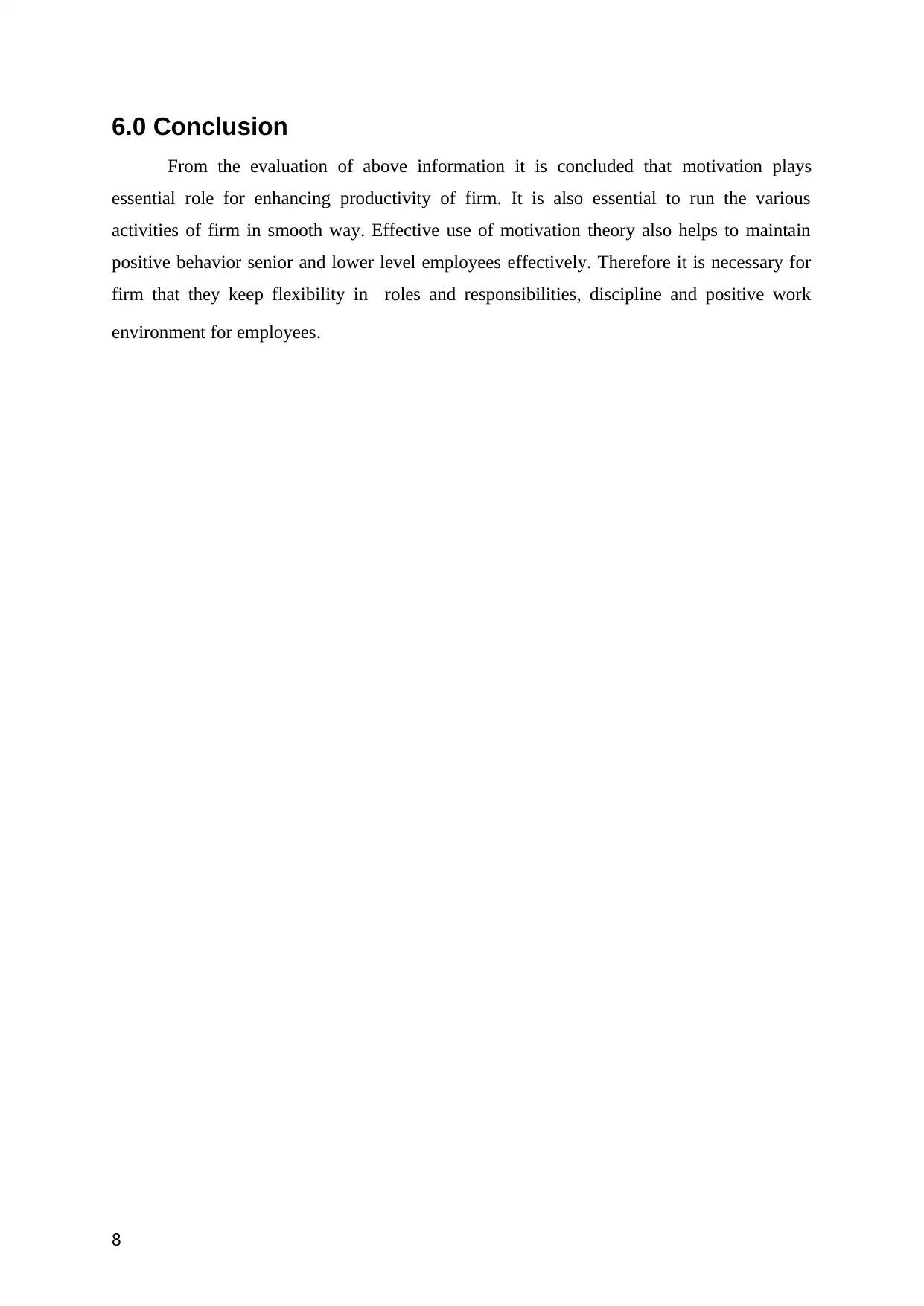
6.0 Conclusion
From the evaluation of above information it is concluded that motivation plays
essential role for enhancing productivity of firm. It is also essential to run the various
activities of firm in smooth way. Effective use of motivation theory also helps to maintain
positive behavior senior and lower level employees effectively. Therefore it is necessary for
firm that they keep flexibility in roles and responsibilities, discipline and positive work
environment for employees.
8
From the evaluation of above information it is concluded that motivation plays
essential role for enhancing productivity of firm. It is also essential to run the various
activities of firm in smooth way. Effective use of motivation theory also helps to maintain
positive behavior senior and lower level employees effectively. Therefore it is necessary for
firm that they keep flexibility in roles and responsibilities, discipline and positive work
environment for employees.
8
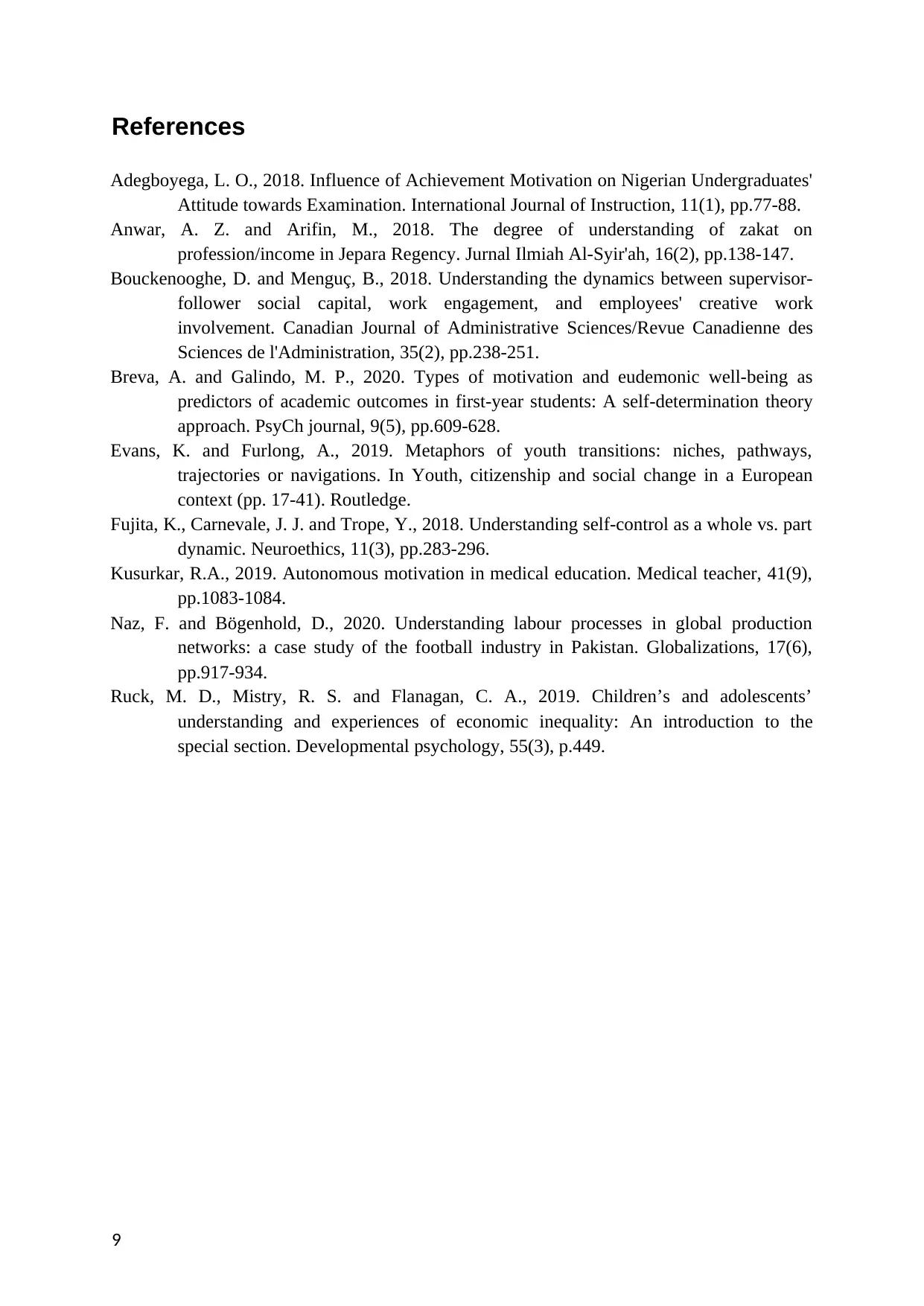
References
Adegboyega, L. O., 2018. Influence of Achievement Motivation on Nigerian Undergraduates'
Attitude towards Examination. International Journal of Instruction, 11(1), pp.77-88.
Anwar, A. Z. and Arifin, M., 2018. The degree of understanding of zakat on
profession/income in Jepara Regency. Jurnal Ilmiah Al-Syir'ah, 16(2), pp.138-147.
Bouckenooghe, D. and Menguç, B., 2018. Understanding the dynamics between supervisor‐
follower social capital, work engagement, and employees' creative work
involvement. Canadian Journal of Administrative Sciences/Revue Canadienne des
Sciences de l'Administration, 35(2), pp.238-251.
Breva, A. and Galindo, M. P., 2020. Types of motivation and eudemonic well‐being as
predictors of academic outcomes in first‐year students: A self‐determination theory
approach. PsyCh journal, 9(5), pp.609-628.
Evans, K. and Furlong, A., 2019. Metaphors of youth transitions: niches, pathways,
trajectories or navigations. In Youth, citizenship and social change in a European
context (pp. 17-41). Routledge.
Fujita, K., Carnevale, J. J. and Trope, Y., 2018. Understanding self-control as a whole vs. part
dynamic. Neuroethics, 11(3), pp.283-296.
Kusurkar, R.A., 2019. Autonomous motivation in medical education. Medical teacher, 41(9),
pp.1083-1084.
Naz, F. and Bögenhold, D., 2020. Understanding labour processes in global production
networks: a case study of the football industry in Pakistan. Globalizations, 17(6),
pp.917-934.
Ruck, M. D., Mistry, R. S. and Flanagan, C. A., 2019. Children’s and adolescents’
understanding and experiences of economic inequality: An introduction to the
special section. Developmental psychology, 55(3), p.449.
9
Adegboyega, L. O., 2018. Influence of Achievement Motivation on Nigerian Undergraduates'
Attitude towards Examination. International Journal of Instruction, 11(1), pp.77-88.
Anwar, A. Z. and Arifin, M., 2018. The degree of understanding of zakat on
profession/income in Jepara Regency. Jurnal Ilmiah Al-Syir'ah, 16(2), pp.138-147.
Bouckenooghe, D. and Menguç, B., 2018. Understanding the dynamics between supervisor‐
follower social capital, work engagement, and employees' creative work
involvement. Canadian Journal of Administrative Sciences/Revue Canadienne des
Sciences de l'Administration, 35(2), pp.238-251.
Breva, A. and Galindo, M. P., 2020. Types of motivation and eudemonic well‐being as
predictors of academic outcomes in first‐year students: A self‐determination theory
approach. PsyCh journal, 9(5), pp.609-628.
Evans, K. and Furlong, A., 2019. Metaphors of youth transitions: niches, pathways,
trajectories or navigations. In Youth, citizenship and social change in a European
context (pp. 17-41). Routledge.
Fujita, K., Carnevale, J. J. and Trope, Y., 2018. Understanding self-control as a whole vs. part
dynamic. Neuroethics, 11(3), pp.283-296.
Kusurkar, R.A., 2019. Autonomous motivation in medical education. Medical teacher, 41(9),
pp.1083-1084.
Naz, F. and Bögenhold, D., 2020. Understanding labour processes in global production
networks: a case study of the football industry in Pakistan. Globalizations, 17(6),
pp.917-934.
Ruck, M. D., Mistry, R. S. and Flanagan, C. A., 2019. Children’s and adolescents’
understanding and experiences of economic inequality: An introduction to the
special section. Developmental psychology, 55(3), p.449.
9
⊘ This is a preview!⊘
Do you want full access?
Subscribe today to unlock all pages.

Trusted by 1+ million students worldwide
1 out of 9
Related Documents
Your All-in-One AI-Powered Toolkit for Academic Success.
+13062052269
info@desklib.com
Available 24*7 on WhatsApp / Email
![[object Object]](/_next/static/media/star-bottom.7253800d.svg)
Unlock your academic potential
Copyright © 2020–2026 A2Z Services. All Rights Reserved. Developed and managed by ZUCOL.